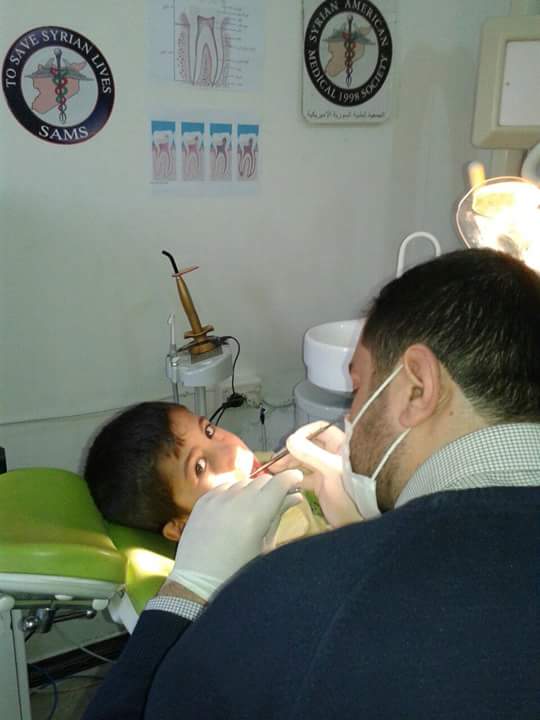Boosting Syria’s Medical Services

When Issam’s hand was badly injured by shrapnel, he expected the worst.
“The injury was so bad my hand was almost severed. I thought it would have to be amputated,” the 19 year-old told Damascus Bureau.
“I ran towards an ambulance supporting my injured hand with my healthy one, and was taken to hospital immediately.”
Once in the operating theatre, Issam begged surgeons not to amputate his hand, explaining that following his father’s death he was his family’s sole breadwinner.
Most of his hand’s nerves, veins and muscles had been severed, but the medical team worked hard for several hours and managed to reconstruct it. Issam later underwent a number of other operations, and has finally reached a point where he could move his hand again.
All Issam’s medical treatment took place at Idlib’s central hospital, where he was cared for by a team of highly experienced doctors working for the Syrian American Medical Society (SAMS).
Mazen Kawara, director of SAMS operations in Turkey, told Damascus Bureau the organisation treats over 85,000 patients a month in Syria’s liberated areas.
“SAMS was founded in the United States in 1998 by a group of US-based Syrian-American doctors,” 41 year-old Kawara said.
“It is a professional body that lends support to Syrian doctors pursuing their studies in the US.
“Before the revolution, the organisation held conferences in Syria to improve the performance of Syrian doctors and to strengthen health care services in the country,” he continued.
After the revolution began in 2011, SAMS opened a number of medical centres in liberated areas to deliver humanitarian and medical services. These centres are run by its offices in Turkey, Lebanon and Jordan, which also serve Syrian refugees.
“Our aim is to support doctors inside Syria to enable them to support Syrian citizens, who heavily rely on them,” Kawara said.
Currently, SAMS has over 600 Syrian-American members. These doctors pay membership fees and organise fund-raising campaigns that attract donations from independent doctors, organisations, and governments including the United States, the United Kingdom and the European Union.
Around a year ago, SAMS began to collaborate with a number of international bodies such as Physicians for Human Rights (PHR), Human Rights Watch (HRW) and Amnesty International (AI) to document violations against the medical sector in Syria.
FREE AND EFFICIENT
Since the beginning of the revolution, SAMS has inaugurated ten field hospitals in liberated areas that specialise in treating serious war injuries. These are located in north and south Syria, and also in rural Homs.
The organisation also opened a large number of primary health care centres to treat common ailments and infectious diseases.
Another SAMS project involves sponsoring psychological support programmes. The organisation has established a number

of care centres inside Syria, and its US-based psychologists regularly travel to refugee camps in Jordan, Lebanon and Turkey to provide support to displaced people, with a special focus on children.
Those who have accessed SAMS services are delighted with their treatment.
Amal, 38, took her four children to the organisation’s medical centre in Maarat al-Numan when they all contracted gastroenteritis.
Treatment was offered for free, as was the medication the family received throughout the recovery process.
SAMS has also founded more than seven obstetrics and maternity hospitals in north Syria, rural Damascus and Daraa.
Rana, who delivered her baby at a SAMS maternity hospital in Maarat al-Numan, told Damascus Bureau about her experience.
“My newborn baby and I both received excellent care and great support from the doctors and medical team,” she said.
“Syrian women are in great need of such hospitals that offer free health care, especially those who have been left poverty stricken by the ongoing war.”
SAMS has also opened nursing and midwifery colleges in Aleppo, Maarat al-Numan and elsewhere.
Ulla has been attending the SAMS midwifery college in Maarat al-Numan, and told Damascus Bureau she was thrilled that she would soon achieve her dream of qualifying.
The 22 year-old said the college was staffed with experienced teachers, and that all expenses including course fees and living costs were provided for.
Hadia Mansour is the pseudonym of a Damascus Bureau contributor from Idlib, Syria.
Read the Arabic version of this article here
